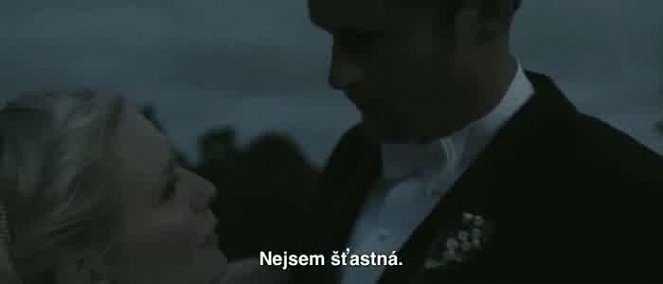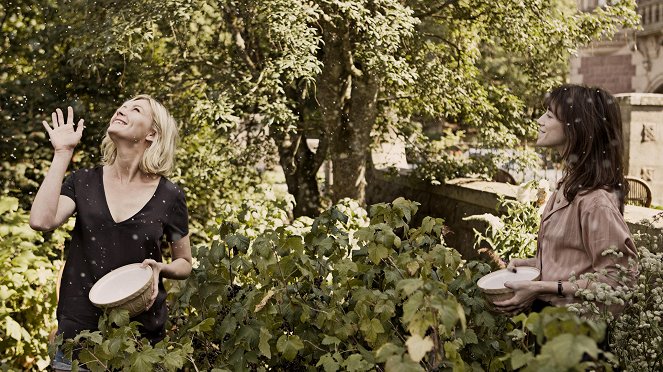Directed by:
Lars von TrierScreenplay:
Lars von TrierCinematography:
Manuel Alberto ClaroCast:
Kirsten Dunst, Charlotte Gainsbourg, Kiefer Sutherland, Charlotte Rampling, Udo Kier, Alexander Skarsgård, Stellan Skarsgård, John Hurt, Jesper Christensen (more)Plots(1)
From acclaimed director Lars von Trier comes the most stunning and compelling film of the year. Winner of the European Film Award for Best Film and the Cannes Film Festival Award for Best Actress (Kirsten Dunst), Melancholia is a beautiful film about the end of the world. Justine (Kirsten Dunst) and Michael (Alexander Skarsgård) are celebrating their marriage at a sumptuous party in the home of her sister Claire (Charlotte Gainsbourg), and brother-in-law John (Kiefer Sutherland). Despite Claire’s best efforts, the wedding is a fiasco, with family tensions mounting and relationships fraying. And as Claire tries to maintain the party's celebratory spirit, Justine struggles against her own dark demons. Meanwhile, a planet called Melancholia is heading directly towards Earth. (Madman Entertainment)
(more)Videos (2)
Reviews (11)
There aren't many male authors who write out their feelings and then let women play it out. I consider Melancholia one of the most honest authorial statements of recent years and the opening prologue with slow motion shots and Richard Wagner's impressive music an aesthetic orgasm. What the 19th hole meant is, I don't think, very indicative (I can already see Von Trier laughing under his beard as he reads the various nonsensical explanatory theories).
()
A pure pleasure. The opening is flawless, the finale fatal. It is excellent for lovers of Richard Wagner and Kirsten Dunst's bust and dimples. The pleasure is multiplied, of course, in the Justine section, which has everything and lacks nothing. Humor is combined with absurdity and symbolism. Why waste the primitive aspects of Udo Kier when we have Alexander Skarsgård's wonderful newlywed games? He hasn't been this close to orgasm since True Blood, and that's saying something.
()
My first meeting with Lars von Trier went very well. After the breathtaking introduction I was sorry I didn't catch Melancholia in the movie theatre. After the first part I was delighted and after the following part I was slightly confused but still extremely satisfied. The combination of handheld "earth" camera, "space" views (of which there are not many), music (Wagner!) and perfect acting performances (with the unbeatable Kiefer Sutherland in the lead) was a success. I probably didn't understand everything, but that's why I'll gladly watch the film again in the future.
()
This is one destruction of the planet that I actually want to see as a movie. And it’s just as powerful as I had imagined. The human perspective gives the circumstances a certain authenticity and the limited cast in the second half also makes the atmosphere suitably intimate. At the same time, the first “wedding" part comes across like a sarcastic view of various character faults, but maybe it was simply meant to make us feel better, that nobody is perfect and maybe that everybody gets what he/she deserves. Excellent casting, with a weird, but utterly perfectly unstuck Kirsten Dunst and a perfect Kiefer Sutherland who gives a great performance of the only normal (or at least the only character I could identify with) character and spends his time drawing any attention to himself, but as soon as Melancholia comes along, it sweep them all from the surface of the Earth. Amazing escalation. The earth is evil.
()
It’s impossible to prepare oneself for Melancholia and the end of the world. Von Trier manages to capture that mood when there’s nothing you can do with a similar sense of urgency as Bergman. But he angers more people and additionally has Earth destroyed. Melancholia is a logical follow-up to Antichrist, which involved a clash between a man and a woman. This time, the clash is between two sisters, two approaches to life and ultimately two planets. The depressive Justine passively accepts her fate. She knows that she can’t change anything. At the same time, she represents extreme individualism. She would rather stay at home alone than submit to social conventions. Claire cares more about others. She doesn’t resign herself to the situation, but she wants to have it under control. Only at the end they switch roles and one finds understanding for the other. In its own way, it is a happy ending that, at the same time, shows how we spend our whole lives running away from the thought of death into magical caves, which can take different forms for everyone, but in the end they are of little help. Melancholia is also a biting polemic on American disaster movies, which conversely try to convince us that tragedy can be averted with human action and ingenuity (and Bruce Willis). Instead of a saviour, von Trier only offers two possible ways to accept the inevitable. On top of that, he forces us to spend the last hour before the end of the world with decadent representatives of high society who are definitely not bearers of noble qualities and have enough problems of their own. He thus doesn’t offer many reasons to wish for the end not to come, which I find more honest than the Hollywood approach. 85%
()



Ads